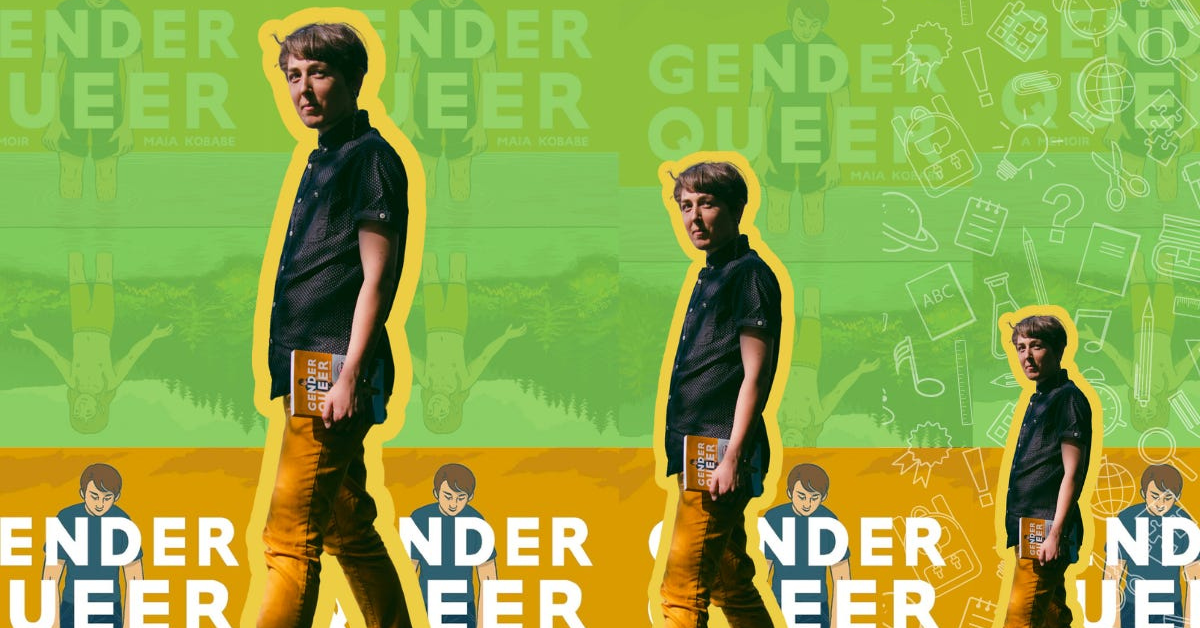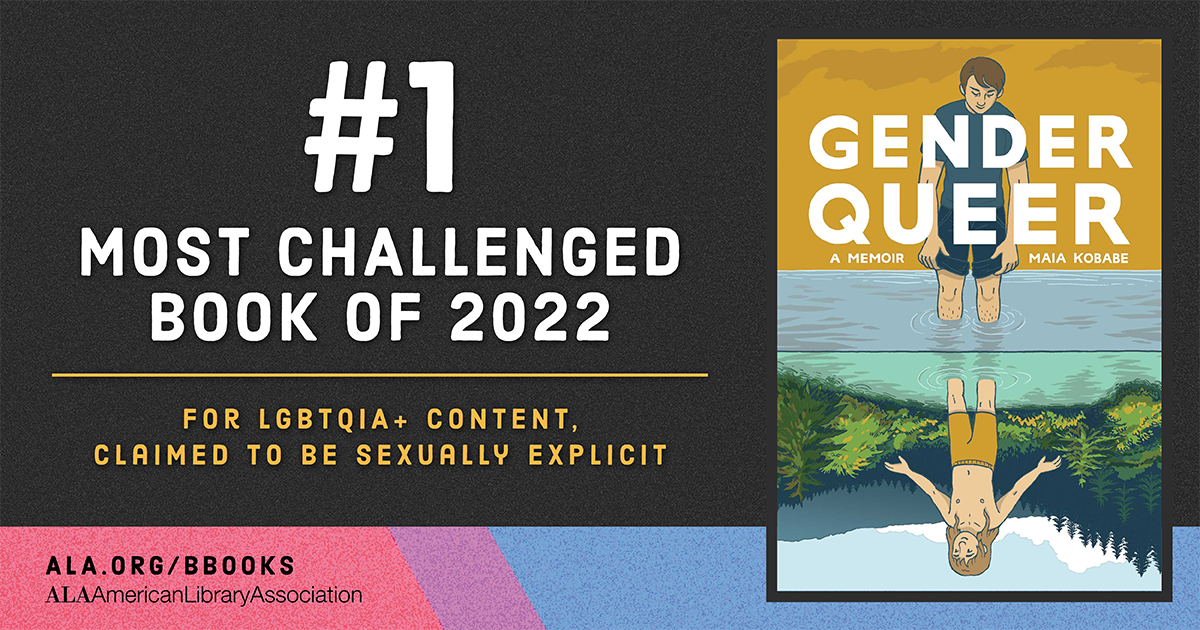
I wanted to write something cutesy like, “I read Gender Queer, so you don't have to,” but that would be bad advice.
With book bans popping up across America like acne, the best soap would be an informed citizenry. Instead of participating in second-hand arguments devised to inflame ill-informed people, we should read the books and determine whether the fight is grounded.
“Gender Queer,” a graphic novel by Maia Kokabe, lands at the top of many banned lists because it details the author’s self-discovery journey and exploration of their gender identity.
The illustrations are simple, homespun, and cute. A light touch and a sympathetic tone capture the emotions they’re describing. This could be something I read in the 1970s as a grade-schooler, except queer.
From their earliest days as a homeschooled child, Maia isn't boxed into gender stereotypes like others. Instead, their parents are crunchy unconventional types who live off the grid, grow food, and share the work of caring for the land, the home, and their children. They speak openly and naturally about the world, and you get the sense that they aren’t burdened by rigid stereotypes of what people should be.
It’s all sweet coming-of-age stuff, with a few hair-raising bumps for an aging father with fluid but conservative-leaning instincts.
It starts on page 32 when Maia’s menstrual cycle begins. Not my favorite illustration. There’s a tame suggestion of masturbation and two nude men embracing and kissing on page 61. On page 125, Maia disrobes for a doctor’s visit, and on page 168, they encounter a strap-on that leaves them dissatisfied.

If I dug deep into my reactions to these pages, it would yield quite a bit of my own “stuff,” my cultural training, faith, fears, and parenting dilemmas, none of which have anything to do with answering the question of whether or not Gender Queer should be in libraries, whether it should exist, or whether its author has a right to be heard by young people who live today the struggle Maia had yesterday.
This is a queer coming-of-age book, and as a person who isn’t queer or coming of age, I appreciate the insight I gleaned from their story, but it was like reading someone else’s email.
I wish every young person could find material that helps them name their emotions, validates their struggles, allows them to make sense of their confusion, and arms them with what they need to define themselves when society tries hard to call them what they aren’t. This book is vital for anyone who’s struggling with their own gender identity or wants to learn more about people who don’t conform to traditional gender roles. But, unfortunately, that makes it dangerous in the eyes of many.
Suppose your kid read this and thought it was okay to be like Maia. How awful that would be.
Suppose the sentiment behind that last sentence was bigoted and the cause of needless suffering in the world.
As one of my readers, you should know I don’t waste your time with pulled punches, so let me get to the bottom of the issue here. Gender Queer is not a problem because concerned parents are raising valid concerns about the age appropriateness of the material. It’s not as if kindergarten teachers are handing this book out to toddlers.
Those concerned parents hate the gays (and the blacks, the immigrants, the Muslims, and so on): period, Hard stop. I won’t spend too much time convincing you of that because if you need convincing, we aren’t operating at the same level of reality.
The fact is gender non-conforming people, including members of the trans community, are bullied into exile, often with fatal consequences. As minorities go, they catch hell from all sides.
If I have to side with anyone in these debates, I’ll side with them and their right to feel good about themselves, to be seen, to know that their lives are of value, and to be protected wherever their tormentors might show up.
According to the National Library of Medicine, I’m not alarmist about the impact of societal rejection of trans people.
Gender-based victimization, discrimination, bullying, violence, being rejected by the family, friends, and community; harassment by intimate partner, family members, police and public; discrimination and ill treatment at health-care system are the major risk factors that influence the suicidal behavior among transgender persons.
Gender Queer is jarring in spots and makes me deeply uncomfortable. I’m old, fat, and comfortable. I’ll get over it. It’s not for me. It’s for someone, though. And that someone needs this book.
I don't have to be the audience to defend its right to save someone else’s life.
Chris Stewart is the Chief Executive Officer of brightbeam. He was named CEO in April 2019, after formerly serving as chief executive of Wayfinder Foundation. He is a lifelong activist and 20-year supporter of nonprofit and education-related causes. In the past, Stewart has served as the director of outreach and external affairs for Education Post, the executive director of the African American Leadership Forum (AALF), and an elected member of the Minneapolis Public Schools Board of Education where he was radicalized by witnessing the many systemic inequities that hold our children back. In 2007 Chris was elected to the Minneapolis Public Schools Board of Education. In that role, he helped establish the Office of New Schools, an area of the Minneapolis Public Schools to implement school reform strategies. At the same time he created the Equity and Achievement Committee, authored a board-level “Covenant with the African American Community,” and advocated safe, orderly, and rigorous schools that prepare students for the real world. In 2011, Chris organized community members for two campaigns in Minnesota: Action For Equity, a grassroots effort to spur innovation in family and education policy at the state level, and the Contract for Student Achievement, a coalition of community organizations working to achieve greater flexibility for underperforming schools through changes to Minneapolis’ teachers’ contract. Since 2009 Chris has been president and principal with Yielding Assets, LLC, a grassroots consultancy helping government, nonprofit, and foundation clients create self-sustaining, social good projects. Chris serves as chair of the board of SFER’s Action Network and also serves on the board of Ed Navigators. Chris blogs and tweets under the name Citizen Stewart. He is based in the Minneapolis area. In August 2017, Chris came together with more than 40 other African-American parents, students and teachers to talk about the Black experience in America’s public schools. These conversations were released as a video series in Getting Real About Education: A Conversation With Black Parents, Teachers and Students.
The fight for educational equity has never been just about schools. The real North Star for this work is providing opportunities for each child to thrive into adulthood. This means that our advocacy...
Your donation will support the work we do at brightbeam to shine a light on the voices who challenge decision makers to provide the learning opportunities all children need to thrive.
Ed Post is the flagship website platform of brightbeam, a 501(c3) network of education activists and influencers demanding a better education and a brighter future for every child.
© 2020–2024 brightbeam. All rights reserved.